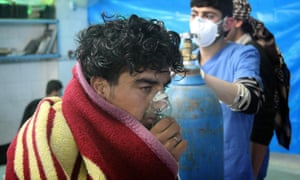The Guardian
The Syrian government is responsible for a third chemical attack against a rebel-held area, an international team has concluded.
In a report released to the UN security council on Friday, and seen by the Associated Press, investigators said there was sufficient evidence to conclude that Syrian forces were behind an attack in Qmenas, in Idlib province, in March 2015.
A device dropped from a high altitude “hit the ground and released the toxic substance that affected the population”, the report said, adding that witnesses and hospital staff identified the smell and symptoms of chlorine gas.
“It is crucial to hold those who use or intend to use chemicals as weapons accountable for their acts, as it is fundamental to deter all those who continue to believe that there is something to be gained in [their] use,” the panel said.
The Organisation for the Prohibition of Chemical Weapons-UN joint investigative mechanism, known as the Jim, in August blamed Syrian forces for using chlorine in two other attacks, and Islamic State for using mustard gas in one.
The conclusion reached in the latest report relates to one of three other attacks that the Jim originally said may have been perpetrated by the government. There was not enough evidence to determine who was behind the two other attacks, it said.
The experts said they couldn’t confirm the use of barrel bombs in Kfar Zita in Hama governorate on 18 April 2014, because the remnants of the device allegedly used had been removed and could not be linked with certainty to the location.
They said additional witnesses corroborated that a canister with traces of chlorine was found in Binnish in Idlib governorate on 24 March 2015. But the exact time and location could not be established and the canister could not be linked to any of the incident locations.
Russia, Syria’s closest ally, has blocked attempts by Britain, France and the US to impose UN sanctions on the Syrian government for using chemical weapons, saying that the evidence presented in August was not conclusive.
The security council is expected to discuss the report on Thursday, but Vitaly Churkin, Russia’s UN ambassador, has already indicated that Moscow will oppose any sanctions.
The Jim, established by the security council a year ago, has investigated nine cases in seven towns where an OPCW fact-finding mission found that chemical weapons had probably been used. The panel has found the Syrian government responsible for two chlorine attacks in Idlib governorate: one in Talmenes on 21 April 2014, and one in Sarmin on 16 March 2015.
It also said Isis was “the only entity with the ability, capability, motive and the means” to use sulfur mustard gas in Marea in Aleppo governorate near the Turkish border on 21 August 2015.


No comments:
Post a Comment